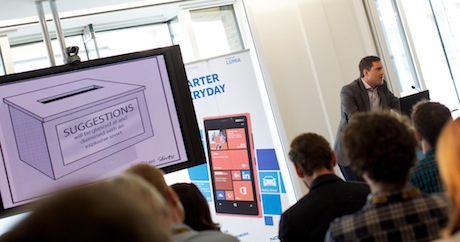Chinwag Psych Interview: Simon Hill - "I don't work in your team but I can still help you"
Simon Hill is founder of the idea management software company Wazoku.
Having worked with project management collaboration software and as an innovation consultant in past incarnations, Hill spotted that there was a missing piece of the puzzle when it came to ensuring that valuable ideas get a hearing and are not lost.
“There was a lack of cohesion early in the ideas process,” he told Chinwag. “Something was needed to work around projects which were worth pursuing.”
Clearly this would be something that most companies would like Hill to develop for them, but as a man who knows about ideas, he realised that this would be something he could develop into his own business.
Shine a light
Pinning down an idea is not always easy. Making sure good ideas come to the fore and are acted upon can be even tougher, especially in very large companies where cross-team collaboration doesn’t often happen and suitable cross-disciplinary work is not always spotted.
To ensure that good ideas rise to the top, the company’s software guides users through a work flow.
“For some this is a very simple process,” says Hill. “You can use our processes or define your own. Say you want to gather ideas around a new marketing strategy. Rather than restricting this to the marketing team only, this can be opened up to the whole company.”
Using Wazoku, ideas can be submitted and then evaluated. Extra fields can be added for further definition or a poll can be used to rank and rate ideas. This turns up a list with the best ideas at the top and these could be submitted from across an entire organisation.
“The goal is to try and make the organisation as transparent as possible so that everybody can make the most informed decisions,” says Hill. “This way everyone can see which ideas are successful and beyond this they can see why they are successful.”
Idea herding
Humans can be almost excessively creative creatures of course and wrangling even the ideas of just one person can be quite a task. According to Hill though, there’s no such thing as ‘too many ideas’.
“We try and solicit ideas in many ways,” he says. “We have discussion forums where the thread can become an idea - you can take all of that and turn it into an concept or a challenge that is spawned through a fairly passive discussion.”
The company also provides a mobile entry point for ideas, enabling another way for more thoughts and concepts to be collected.
Along with the collection of ideas, Hill also works on ways to make sure thoughts end up in front of the right people.
“We want ideas to find the best people, the decision makers in an organisation. We apply a profile based on what you do, what you talk about what you interact with and how successful you are with those things,” he explains.
“So when new ideas come into a system we will try and help them find you and push them to you. If it fits with your profile and expertise we can then get your feedback on it.”
Idea management still appears to be a bit of a slippery process but Hill notes that not only does he help others with methods for this but that he is also still finding new things himself.
“It's been a learning process,” he says. “To get here was a two-year iterative process of test and fail, test and fail in terms of what is useful and how to surface the most useful information from people. We also learned which information we need to keep back from people so that it doesn't become overbearing and unmanageable as a process.”
Empower the employee
 Transparent ideas processes let everyone in a company see how their contributions can help a business. Having a clear sense of purpose at work tends to lead to a better feeling about the job that you do.
Transparent ideas processes let everyone in a company see how their contributions can help a business. Having a clear sense of purpose at work tends to lead to a better feeling about the job that you do.
“Just because I don't work in your team, doesn’t mean I don't have ideas that could help you do your job better,” Hill points out. “We value your voice no matter where you are.“
“We have league tables and we show who the top contributors are,” he says “We try to tie that in with HR to create recognition programmes. So someone does deliver something of true value, they should be recognised for it and it can be championed.”
This type of feedback is also something that an employee can control. “People can see the value of what they do this way,” says Hill. “When I think of something I can see if it is unique or not. If it is new, then I can see when it has gone through to deliver something.”
This can help to empower people in business and create a healthy sense of contribution. This is something that Hill believes is vital in running a company.
“In my mind, the most successful businesses don't treat their employees as a work force, they treat them as individuals,” he says. “We want people to engage with the platform but ultimately it comes down to a personal level that says 'we recognise and value you'. Whatever it is that will work for you to come and share and empower you; that is a method we want to push forward.”
And the word Wazoku? That means 'great idea' in Swahili.
Photo (cc) Benjamin Ellis





